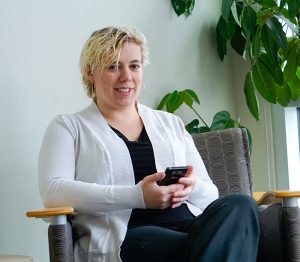
Diana Cooper is a bridge between people. As a Community Health Worker for a local organization, she connects patients and their families with doctor’s offices, social agencies, rehab facilities, and other resources they need to rebuild a healthy life. Whether she accompanies a member to an appointment or helps a family fill out paperwork, she is passionate about every aspect of her job.
Why? Because someone once did it for her.
Three years ago, the Medford mother of four was using heroin, at one point homeless and living in a van in the Walmart parking lot. Her husband, who had a long history of drug use, insisted the couple get help. So he turned them in to the Department of Child and Family Services, and they voluntarily enrolled in a residential rehab program where they were able to take their children with them. Today, Diana and her husband are clean, their children are with them, and they are working in the healthcare field.
“I connect with members on a personal level,” she says. “I believe you have to support the whole family in order for one member to succeed.” In Diana’s current role, she guides them through the labyrinth that is the health care system, ensuring they get the resources they need. Often, it involves multiple agencies. “Many of these families are living in poverty,” she says. “The journey for them is so disjointed, and I am here to walk them through it.”
Diana is now paving a new path for her future in RCC’s Family Support Services program, a degree that will enable her to further her career in community health and early childhood education. Coursework prepares students for jobs as a family advocate, home visitor, parent educator, or family outreach worker, among other occupations. In these roles, graduates help clients with a range of concerns including drug or alcohol addiction, marriage or financial hardship, caring for an elderly parent or disabled child, children with parents in the hospital or prison, and problems accessing services due to language barriers.
A classic “Helper” in the Holland Codes chart, Diana believes the community will not progress without professionals dedicated to coordinating care. One of her favorite aspects of the Family Support Services degree program is that it teaches trauma informed care.
“Trauma, no matter what kind it is, changes a person emotionally and physically,” she says. “You have to understand who you are helping.”
Diana’s own traumatic history of drug abuse started innocently enough at age 18, when she was prescribed opiod painkillers for meningitis. Unfortunately, she was never able to wean off the meds. When her tolerance for the prescriptions was too high, she turned to street drugs, including heroin and then cocaine. After a decade of spiraling addiction, Diana finally realized she was choosing drugs over her family. She is grateful to the counselors and support agencies who gave her a chance to turn her life around, and now she wants to help others struggling through similar circumstances.
“I am doing this so I can be a guide for others who are living a life I know too well,” Diana says. “It is my purpose in life.”
